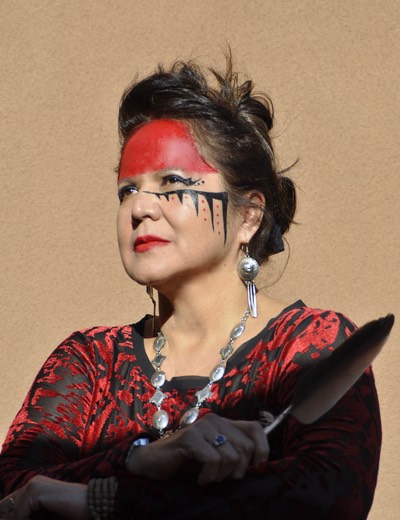
- Details
- By Darren Thompson
Late Monday night, Joanne Shenandoah passed away at the Mayo Clinic in Scottsdale, Arizona following complications of abdominal bleeding and suffering a cardiac arrest. She was 64 years old.
Shenandoah was a member of the Wolf Clan of the Oneida Nation and was the most critically acclaimed and honored Native American singer since her debut recording in 1989, according to the Native American Music Awards.
Want more Native News? Get the free daily newsletter today.
“This was not her time, my beautiful Mom saved countless lives with her angelic voice and heart as big as the Universe,” said Leah Shenandoah in a Facebook post. “I am honored as her daughter to carry on her message of peace and compassion through the arts. I can feel her love around me and don’t know how to live life without her.”
Joanne Shenandoah recorded a total of 15 albums with numerous other collaborations. Her music has been awarded multiple awards, including 14 Native American Music Awards, which is the most awarded to a single artist in the awards program, said Bello. She also won a Grammy Award for her contribution to “Sacred Ground: A Tribe to Mother Earth”. She was nominated for two Grammy Awards for her albums, “Covenant” and “Peacemaker’s Journey”. She was inducted into the Syracuse Area Hall of Fame, and has received an Honorary Doctors of Music from Syracuse University in 2002.
As the Native American Music Awards most decorated and honored artist with 14 Native American Music Awards, Joanne’s music has been honored with numerous awards, including Best Children’s Recording, Best Traditional Recording, Best Music Video, and Best Producer, as well as awards for Best Female Artist, New Age Recording, Best Compilation, Artist of the Year, and Best Compilation.
“We not only have lost our most decorated voice, but we’ve also lost a mentor, a role model and a friend who was loved by all,” said Native American Music Awards Founder and Director Ellen Bello to Native News Online. “She truly cared about others and paved the way for so many. She leaves an unfillable void in our community and in our hearts.”
Over her five decade plus career, Joanne has performed at The White House, Carnegie Hall, Native Nation Inaugural Balls, Madison Square Garden, The Smithsonian’s National Museum of the American Indian, Woodstock ’94, and participated in the celebration of the canonization of Kateri Tekakwitha, the first American Indian Saint at the Vatican.
“Joanne is to contemporary Native American music what Aretha Franklin, Etta James, or Billie Holiday are to their respective genres,” said Ed Koban, a Native American Music Award nominee and Mohawk tribal member to Native News Online. “A timeless and elegant voice that did not need vocal tricks or gymnastics, instead was gentle, soft and pure. Joanne was always kind and supportive and am grateful to have been her friend.” Koban has shared the stage with Joanne at the Native American Music Awards ten separate times.
She leaves behind her husband Doug George-Kanentiio, daughter Leah, grandson Kieren Ryder, sisters Diane and Vicky and numerous nieces and nephews.
Her family has created a GoFundMe to assist with medical costs. “Please consider donating and sharing this fundraiser for one of Haudenosaunee’s most treasured singers,” said the Shenandoah Family in today’s posting.
“We can only take some comfort in knowing that her mesmerizing and angelic voice surrounded by her truly timeless music will remain with us forever. But she will be so incredibly missed,” said Bello.
More Stories Like This
Native News Weekly (August 25, 2024): D.C. BriefsUS Presidents in Their Own Words Concerning American Indians
Native News Weekly (December 14, 2025): D.C. Briefs
Wounded Knee Massacre Site Protection Bill Passes Congress
Two Murdered on Colville Indian Reservation
Help us defend tribal sovereignty.
At Native News Online, our mission is rooted in telling the stories that strengthen sovereignty and uplift Indigenous voices — not just at year’s end, but every single day.
Because of your generosity last year, we were able to keep our reporters on the ground in tribal communities, at national gatherings and in the halls of Congress — covering the issues that matter most to Indian Country: sovereignty, culture, education, health and economic opportunity.
That support sustained us through a tough year in 2025. Now, as we look to the year ahead, we need your help right now to ensure warrior journalism remains strong — reporting that defends tribal sovereignty, amplifies Native truth, and holds power accountable.
 The stakes couldn't be higher. Your support keeps Native voices heard, Native stories told and Native sovereignty defended.
The stakes couldn't be higher. Your support keeps Native voices heard, Native stories told and Native sovereignty defended.
Stand with Warrior Journalism today.
Levi Rickert (Potawatomi), Editor & Publisher
